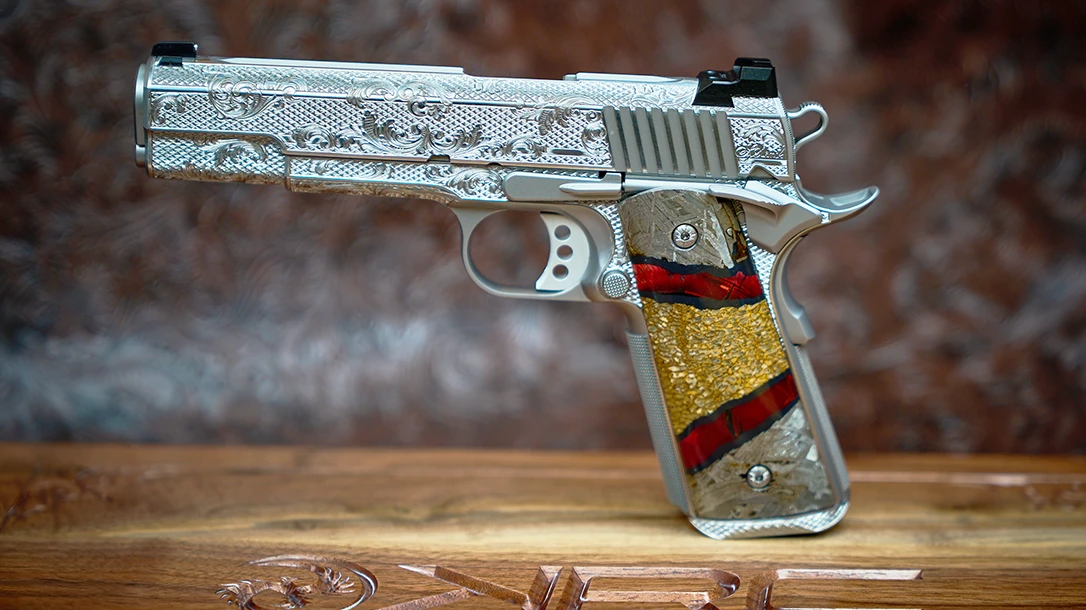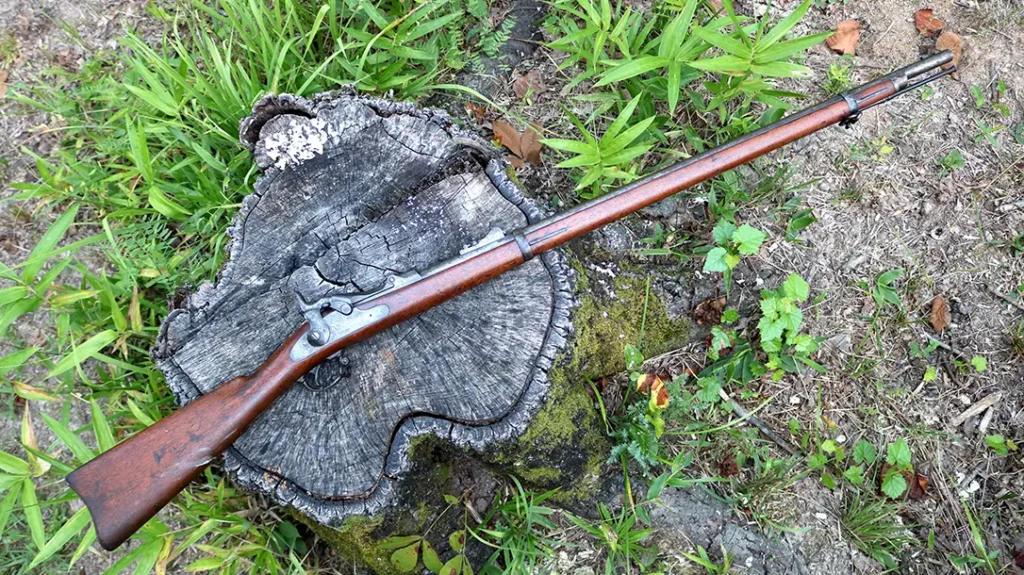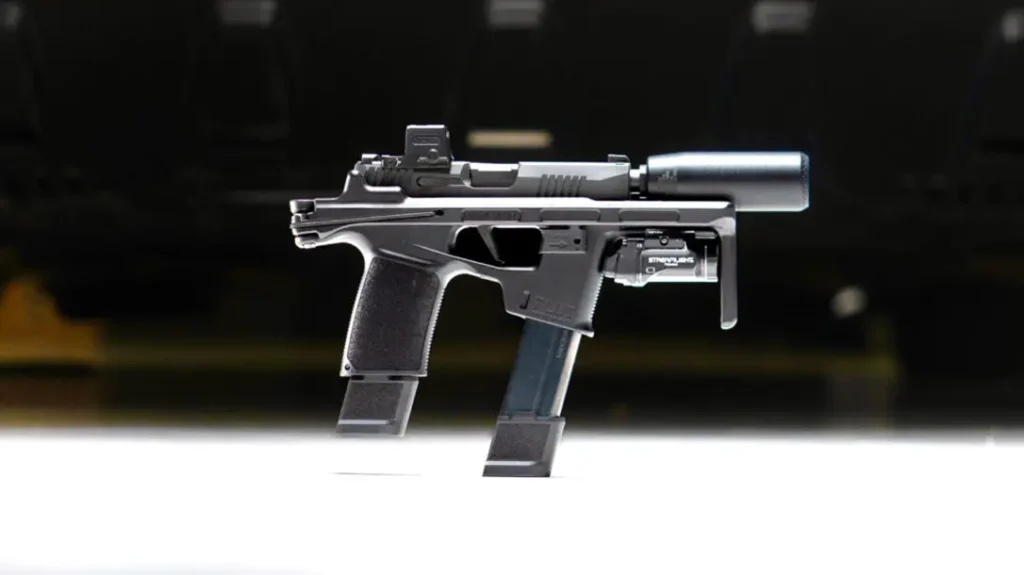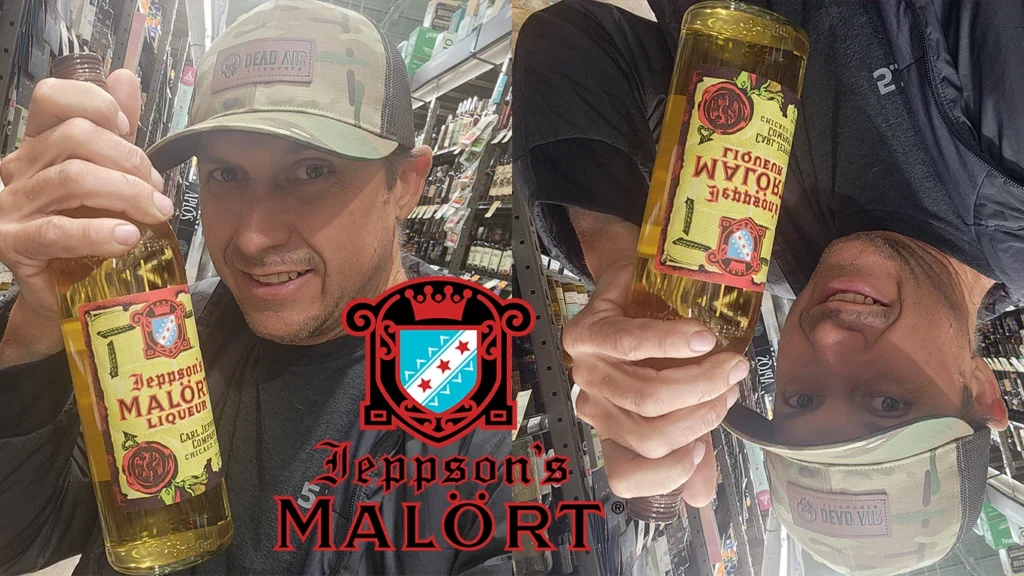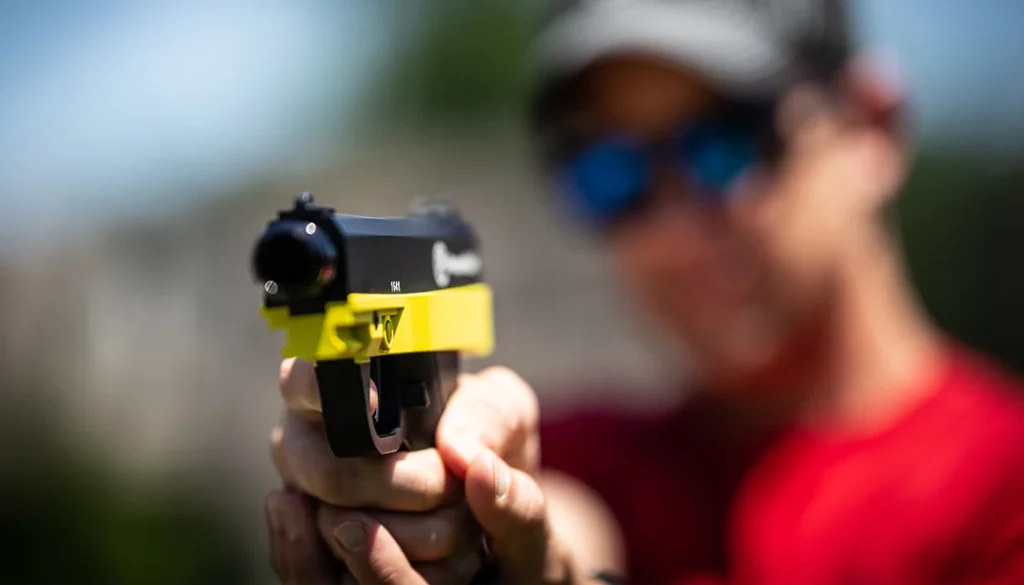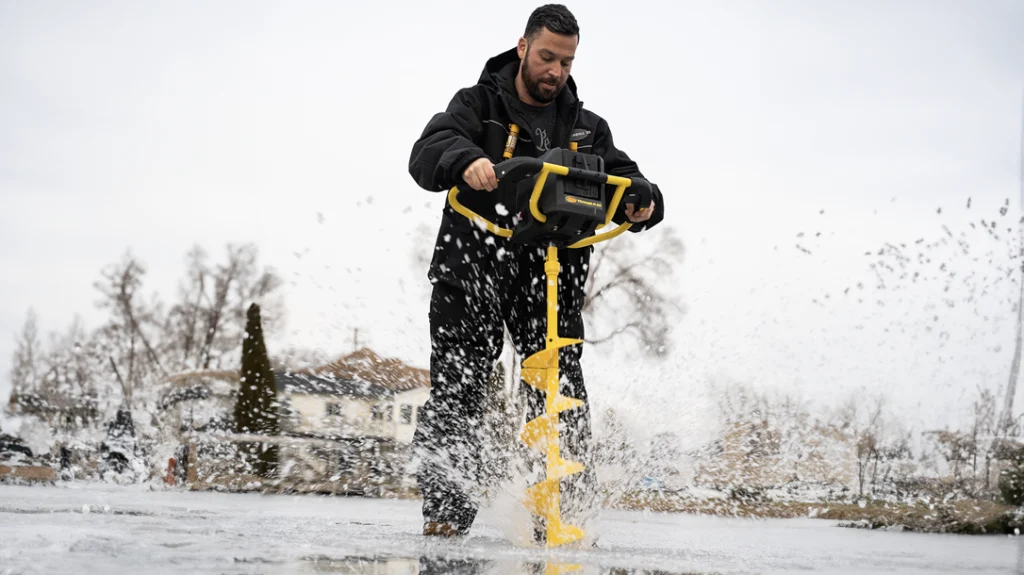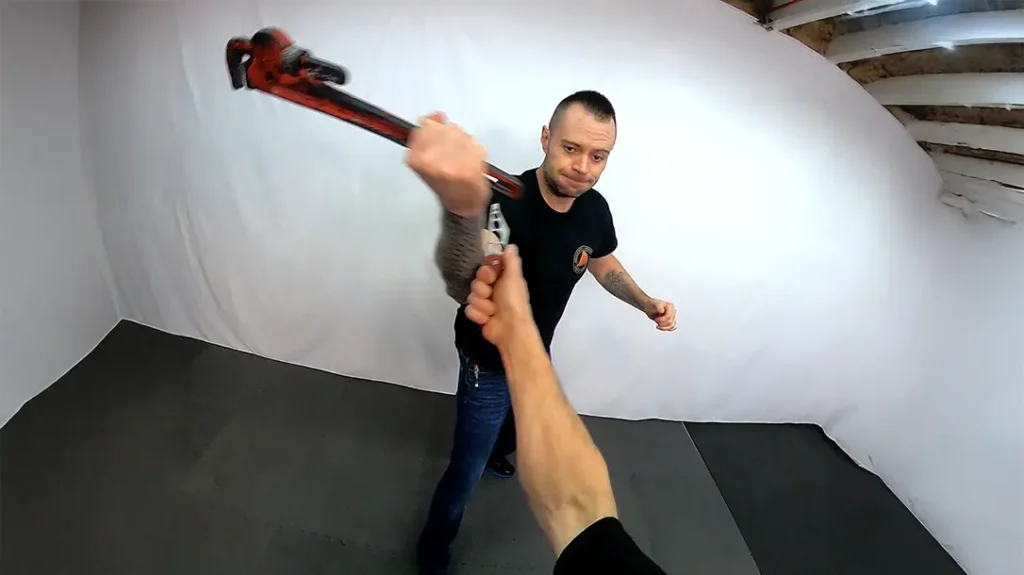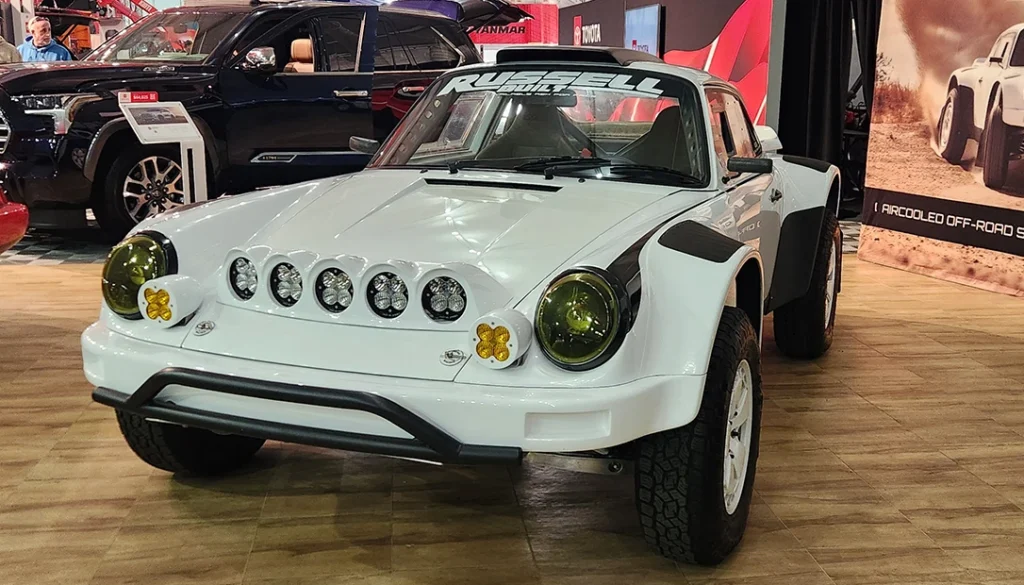It’s not every day that you hold a 1911 and feel like you’re staring into the heart of a culture, a war, or a world that existed long before gunpowder was ever imagined. But that’s exactly what happens when you hold a Kings River Customs 1911 engraved by Alex Surmak.
I’ve spent time around a lot of custom work. I’ve handled guns that were tuned to perfection, finished like jewelry, and built to function forever. But Kings River Customs doesn’t just build guns. They build narrative. They forge a connection. And when you look at one of their collaboration pieces with Ukrainian master engraver Alex Surmak, it’s hard not to feel that something bigger is being said through steel.
That was the first thing I felt when I saw the now-iconic “Extinction” 1911 in its presentation case—its silvered surface chiseled and carved into a living story, and its grips packed with literal history: fossilized mammoth ivory, dinosaur bone, and meteorite. This wasn’t a gun you carry. This was a message. And as I would later learn through conversations with both KRC CEO Matt Riker and Alex himself, that’s exactly what it was meant to be.
Advertisement — Continue Reading Below
Alex Surmak Origins
Alex Surmak’s journey is one you don’t gloss over. Born in Ukraine, he’s not just a craftsman—he’s a guardian of tradition and a voice of identity. His artistic roots stretch back to vocational school, where metalwork first sparked something deeper. He spent years refining his skill, blending Old World technique with his own evolving style, and eventually built a reputation as one of the finest metal engravers in the firearm world.
“When I engrave,” Alex told me, “I try to express what I feel at that moment. It’s like music—it can be soft, loud, calm, angry. But it always says something.”
That personal approach is what sets his work apart. For Alex, a surface isn’t just a place to put scrolls—it’s a canvas to transmit story. He’s not decorating guns. He’s chronicling mood, culture, and memory.
Advertisement — Continue Reading Below

That intensity of meaning is what drew Kings River Customs to him. “We knew right away Alex wasn’t just another engraver,” Matt Riker said. “He wasn’t just building patterns. He was building messages.”
And together, they’ve made firearms that do exactly that.
Advertisement — Continue Reading Below
“My Beloved Kyiv”
Before we get to the projects with King River Customs, we have to talk about the Sig P226—because it gives you a window into how deeply Alex’s engraving is intertwined with identity and memory.

Completed outside of KRC, My Beloved Kyiv is arguably Alex’s most ambitious personal project. Built on a Sig Sauer P226 X5, it is a tribute to the city of Kyiv—a reflection of its architectural beauty, spiritual depth, and cultural legacy. The entire piece took ten months to complete.
Advertisement — Continue Reading Below

Using stainless steel to preserve the color and purity of the medium, Alex and his team engraved 19 of the city’s most iconic landmarks. The design incorporates relief, bulino, sculptural elements, and even 119 diamonds set into the frame and slide. A 24-carat gold inlay runs throughout the engravings, weaving together a glowing narrative of Ukraine’s capital.

Advertisement — Continue Reading Below
“This project wasn’t just about beauty,” Alex said. “It was about remembering. It was about telling the story of where I come from in a language I know best—engraving.”
It’s not just craftsmanship—it’s citizenship. It’s defiance. And it’s one of the most significant engraved firearms in the world today.
The 1911 “Extinction”: Metal, Memory, and Meteors
Then you turn to the KRC 1911.
Advertisement — Continue Reading Below

Built by Kings River Customs and engraved by Alex, this was the first piece they collaborated on. It doesn’t have a named backstory like the SIG—but it doesn’t need one. This 1911 was designed as a showcase of capability, and it shows.
The grip panels alone are a universe unto themselves. Polished resin holds three materials not found in your average build sheet—fossilized mammoth ivory, dinosaur bone, and meteorite. The effect is profound. You’re not just holding a pistol. You’re holding millennia.

“You can’t fake that kind of gravity,” Matt told me. “We didn’t build this to be tactical. We built this to be timeless.”
The engraving on the slide and frame is classic Surmak—deep, flowing, symmetrical, but never predictable. The lines wrap around the gun like they were born there. And just below the rear sight, KRC’s fighting phoenix stands engraved—a symbol of rebirth, transformation, and fire-forged endurance.
“There’s no backstory,” Matt added. “But if you stare at that thing long enough, one will come to you.”

Crowning the incredible build is a bespoke display case featuring handcrafted elements, integrated lighting, a continuously rotating platen, and hidden storage. The case alone reflects over 100 hours of work by a master furniture maker, perfectly tuned to match the tone and presence of the piece it holds.
Their Own Words
Both Alex and Matt work in disciplines where every mistake is permanent. There’s no ‘undo’ in engraving or in building high-end 1911s. That’s part of the draw. It’s unforgiving, and it demands intention.
Matt told me, “What people don’t see is how much of ourselves we pour into these guns. It’s not just about parts and tolerances. When we work with Alex, we’re not building a platform for decoration—we’re building a foundation for expression.”

Alex agreed. “When I engrave a firearm, I see it as an extension of a person. I want to capture something unique about the gun—and maybe even something the owner hasn’t said out loud.”
That mindset is what allows these pieces to resonate beyond just collectors. They feel personal even when you’re just looking at them from behind glass.
Legacy of Craft
In a world that’s increasingly digital, fast-paced, and mass-produced, what Alex Surmak and Kings River Customs are doing feels like a small act of rebellion. It’s a defiance against speed, a stand against disposability. It’s the reminder that some things are still worth doing by hand.
Every etched line, every hand-fit part, every phoenix cut into a slide—it all whispers the same thing: take your time, do it right, and leave something behind that matters.

These aren’t just weapons. They’re timepieces, artifacts, and proof that even in this modern era of quick clicks and instant gratification, true craftsmanship still breathes.
You can feel it in the meteorite under your grip. You can see it in the layered shading of a Bulino scene. And you can hear it in the way both men speak about their work—with reverence, pride, and the knowledge that someday, long after we’re gone, their creations will still be here.
As Alex put it, “Legacy isn’t about making something last. It’s about making something mean something. That’s why I engrave.”
Blueprints for Collaboration
What sets Kings River Customs apart, and what makes this partnership with Alex Surmak feel so powerful, is their mutual obsession with significance. In an age of mass-produced components and quick-turn CNC builds, KRC is slow on purpose. Every piece is custom-fitted, matched, and refined. Every line is considered. And when the gun is done, it isn’t just another 1911—it’s the only one like it on Earth.

Matt described the company’s process to me as “bespoke American,” and that phrase stuck with me. Because that’s exactly what they’re doing. They’re taking the most iconic American pistol—the 1911—and building each one like a tailored suit. And then they’re putting that suit into the hands of a guy like Alex, who turns it into a cathedral.
Final Thoughts
I’ve written about a lot of custom shops. I’ve shot a lot of 1911s. But there’s something happening at the intersection of Kings River Customs and Alex Surmak that defies easy classification. These guns aren’t just high-end. They’re not just rare. They’re ritualistic.
You don’t buy one because you need another gun. You buy one because you believe there’s still room for things to be done right. Because you believe tools can be beautiful. Because you believe stories can be carved in steel.

“My Beloved Kyiv” and the Extinction 1911 aren’t just milestones in custom gunwork—they’re reminders that in the right hands, craftsmanship becomes language. And language, when wielded this well, becomes memory.
If you ever find one of these pieces in your hand, don’t just look at it—listen to it. There’s something in that steel worth hearing.
